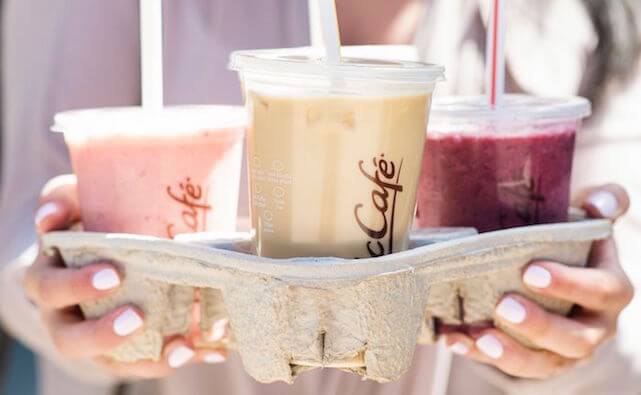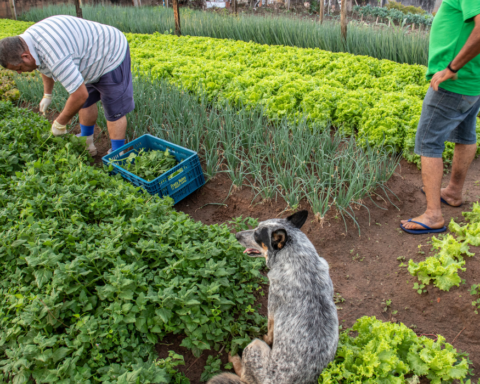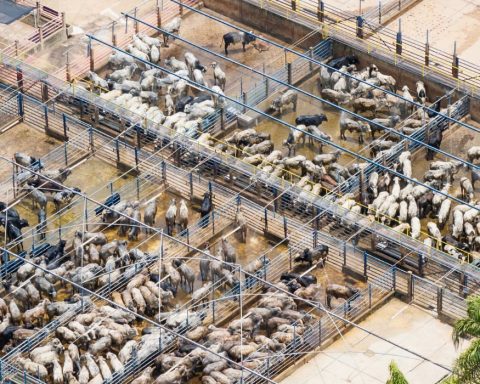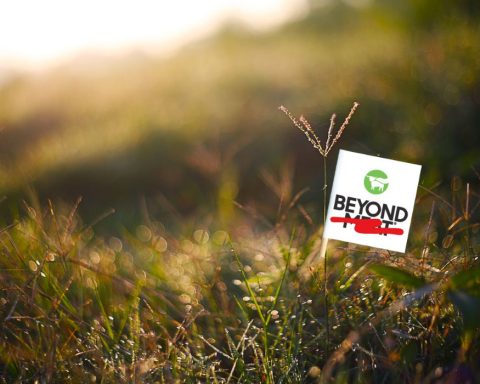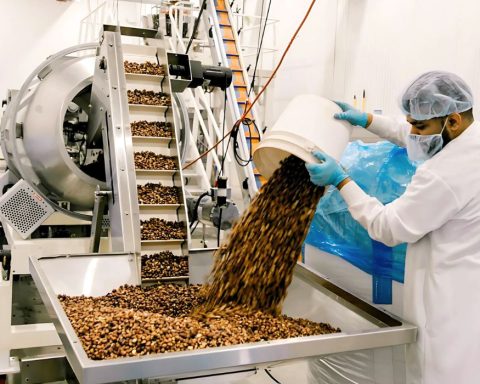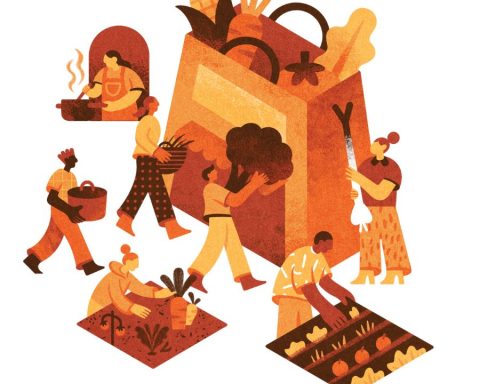McDonald’s Canada is shaking up its packaging strategy almost a year after Greenpeace revealed the fast food giant was one of the country’s top five plastic polluters in shoreline waste audits.
When diners head to the McDonald’s on Wonderland Road South in London, Ont. or the Vancouver spot on Hastings Street starting August 19, they’ll notice several differences between those restaurants and the country’s 1,448 others.
Instead of plastic, wooden cutlery and stir sticks as well as paper straws will appear at the two “green concept restaurants” as part of a pilot for the multi-billion dollar chain. The stores will also serve fully recyclable soda cups with new fibre lids that diners can sip from straw-free.
Across Canada, the company has already begun selling McWraps in thin paper wrapping instead of a thicker carton, ditching foam gravy bowls and breakfast platters, emblazoning Happy Meals with recycling instructions and serving coffee in “light-weighted” cups. All told, the moves will remove more than 1,500 tons of packaging materials from the McDonald’s Canada system annually. It’s all part of an ambitious plan to ensure that 100 per cent of McDonald’s consumer packaging comes from renewable, recycled or certified sources by 2025.
Many have applauded the push. When a fast food giant as prolific as McDonald’s makes bold moves to increase sustainability, it’s bound to have an impact and persuade competitors to follow suit, they reason.
After all, McDonald’s was rated by Forbes Magazine as the 10th most valuable brand in 2019, placing it in the same realm as Apple, Google, Microsoft and Amazon. The closest fast food competitor on the list was Starbucks, which ranked just 35th. Its influence has been engrained in North American culture since the brand debuted in California in the 1940s and Canada in 1967 and quickly became the largest fast food restaurant chain in the world. But in the past decade, competitors have been taking a bite out of the brand. In 2011, Subway surpassed McDonald’s to become the world’s biggest quick service restaurant in terms of store units. By 2015, the business press was asking whether the golden days of the golden arches were over.
It has spent the last few years renovating stores, introducing all-day breakfasts, announcing cage-free egg and deforestation-free pledges as well as discounted items, and it’s finally paying off. According to July’s second quarter earnings report, global same-store sales expanded by 6.5%, more than they have in seven years. Its stock hit an all-time high.
The brand isn’t staying complacent. It’s been introducing digital ordering kiosks to restaurants, more all-day breakfast options and partnering with delivery services. But the chain mainly sat back and watched while quick-serve competitors including Recipe Unlimited restaurants like Harvey’s and Swiss Chalet as well as A&W got out ahead of the growing discontent over plastic pollution by committing to scrap plastic straws last year. McDonald’s made the switch in the U.K. and Ireland and started testing alternatives in the U.S., but left Canadians sipping from plastic straws.
Two Canadian locations will pilot plastic-free straws starting August 19.
Rob Dick, a supply chain officer at McDonald’s Canada, had been hearing the calls for paper straws in particular. His staff noticed they were being offered at other restaurants long before McDonald’s decided to pilot them in Canada.
“We [were thinking], man, we need to do that, but to think about the infrastructure required to produce paper straws for a system that has 1,450 restaurants is much different from the infrastructure that’s required to produce paper straws for two restaurants,” he said.
“The packaging supply in particular for quick service restaurants has been built over the past 50 years,” said Dick. “We’re going to try and change it in five or six and that’s not going to be easy.”
Of course, packaging is just the proverbial tip of the iceberg if McDonald’s truly wants to refashion itself as a sustainability champ.
Experts like Kernaghan Webb, the director of the Ryerson University Institute for the Study of Corporate Social Responsibility, are happy to see McDonald’s latest packaging efforts, but say there’s still plenty more work for the brand to do to become truly planet-friendly.
He sees the green concept store project as falling short since it only tests packaging innovations, not product innovations that have sustainability implications, including how crops are cultivated and livestock are raised. “A focus on environmental and social sustainability concerning the food itself, and not just the packaging, should be an ongoing central preoccupation for McDonald’s and its competitors,” said Webb.
Transitioning from a McWrap carton to a thinner paper wrap is one of several “light-weighting” initiatives which will curb 1,500 tons of packaging from McDonald’s Canada stores annually.
The company has said it’s implementing sustainability assessments on farms and is piloting sustainable beef certification in Canada, but greening its global supply chain has been a challenge. McDonald’s soy feed for its chicken has been linked to Amazon rainforest deforestation, despite repeated pledges to help end deforestation in its beef, soy, palm oil and paper products. Last month, McDonald’s main chicken and beef supplier, Cargill, was named the ‘worst company in the world’ by the environmental nonprofit Mighty Earth because of ongoing deforestation issues related to animal feed in Brazil’s Cerrado region along with pollution and meat contamination concerns.
McDonald’s also plummeted from tier two to tier three on the 2018 Business Benchmark on Farm Animal Welfare rankings, which measure 150 companies practices around the treatment of animals.
Robert Carter, a food expert with research firm NPD Group, said plant-based proteins should be the next move on McDonald’s radar. The fast food giant has been testing its Big Vegan burger made of soy (no word on whether any of that soy comes from Cargill) and wheat in some European and Israeli locations, but it’s lagging behind the competition in the North America market. Plant-based products are already a fixture on the menus of fast food chains like A&W, Tim Hortons, Harvey’s and Burger King.
“I would imagine that deep within the organization there is definitely testing going on and they would come out with a version of the plant-based protein offering within the next 12 months,” said Carter.
He also expects McDonald’s to scrap plastic Happy Meal toys within the next 18 months. It’s already testing alternatives to plastic in the U.K. after a British petition (now signed by more than 415,000 people) demanded that McDonald’s dump its plastic toys. The U.K.’s environment minister, Thérèse Coffey, took up the cause when she called on the brand in October to make “symbolic change, even if the amount of plastic involved is not actually that much.”
McDonald’s Canada says it has been “investigating different options,” including books, to offer as an alternative to toys.
Regardless of what measures McDonald’s rolls out, the company has its work cut out for it.
Competitors are also scrambling to boost sustainability to meet shifting consumer demands for more planet-conscious offerings. A 2018 Restaurants Canada survey of those managing 6,920 restaurants in the country revealed 56% have plans to reduce the number of single-use items in their operations. Another survey from the organization that year showed that 92% of the operators of 4,694 establishments plan to continue or improve on their current level of environmentally sustainable operations over the next three years.
Unless the sector adapts quickly, “the fast food industry may see its own potential extinction or at least it may become greatly diminished if it doesn’t change,” says Deborah De Lange, who has researched the intersections between entrepreneurship, climate change and sustainable development.
But Dick is confident the company can prove McDonald’s critics wrong, learn from its pilot restaurants and meet its goal to have 100 per cent of its consumer packaging derived from renewable, recycled or certified sources by 2025.
“We’re on a journey here at McDonald’s,” said Dick. “It’s a journey to a more sustainable planet.”


